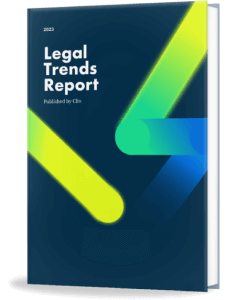It’s been more than two years since the COVID-19 pandemic upended daily life for most of the world.
In the wake of this upheaval, Clio’s 2020 Legal Trends Report tried to make some sense of the changes we were seeing across the legal space, and made some predictions about how the pandemic would continue to impact legal professionals in the future.
In that report, we imagined a “better normal”, one which would take the place of the “old” normal and lead to positive changes across the legal space.
This year’s Legal Trends Report explores how lawyers are trying to strike a balance as the demand for legal services reaches record highs in 2022: Lawyers are adapting to the spread of remote work, how the way that legal professionals work is fundamentally changing, and what this means for their well-being.
Now, with the pandemic two years on, much has changed now that the legal space has had time to adapt and overcome the challenges.
The pandemic and the Legal Trends Report
The Legal Trends Report is now in its seventh year. This annual report includes aggregated and anonymized data from tens of thousands of legal professionals in the United States (US) and survey responses from legal professionals and general consumers on what they deem most important today.
The 2022 Legal Trends Report builds off of the 2021 Legal Trends Report and recommends adapting to changing consumer expectations (including the desire for more flexible legal services and remote services) as a critical consideration for law firm success.
This data provides essential insights into how legal professionals use technology, as well as technology’s impact on firm performance.
Two years later: What has changed?
VUCA and VUCA Prime minsets
In the 2020 Legal Trends Report we discussed the concepts of VUCA and VUCA Prime as a framework for coping with the challenges of the pandemic.
- VUCA, Volatility, Uncertainty, Complexity, and Ambiguity, was originally coined in the military as a way of describing adverse conditions on the modern battlefield
- VUCA Prime represents a way to take positive action when dealing with a VUCA environment.
Have we seen a VUCA Prime mindset take hold as a response to the COVID-19 pandemic? In many legal practices, the answer is yes.
The 2021 Legal Trends Report explored the role of agility—being flexible in order to meet goals—and found that this is a key trait that consumers are looking for. Surveys indicated that 79% of consumers prefer to have the option to work both in-person and remotely with their lawyer, signalling a need for legal professionals to provide flexibility in their operations.
The 2022 Legal Trends Report indicates the legal industry is still trying to find its balance to meet the VUCA environment head-on. The demand for legal services reached record highs in 2022, putting an added pressure on lawyers that has blurred the lines between work and life.
This is why why finding solutions that allow law firms to do more with what they already have is so vital. Law firms need to run an efficient business while providing a good client experience too. The impact law firms have is profound, but lawyers have a lot on their plate and are already doing everything they can to keep up.
Data from the 2022 Legal Trends Report also showed that law firms who use practice management software were:
- 33% more satisfied with the relationship they had with their clients
- 24% more satisfied with their relationships with colleagues
- 15% more satisfied with their personal lives.
As the immediate impact of the pandemic subsides in some places, it will be important for lawyers to continue to deploy VUCA Prime to navigate the equally confusing and uncertain path back to a post-pandemic world.
Firms are more client-centered
The pandemic highlighted just how behind the legal industry was in technology. But as businesses were forced to embrace the virtual world, so too did legal. And that shift meant a focus on technology and clients, rather than wasteful processes.
In 2020 we expressed our hope that the pandemic would eventually give way not just to a “new” normal, but a better normal for everyone. In regards to the legal space, we hoped that this would take the form of client-centered approaches to delivering cloud-based legal services.
What we have seen thus far is a clear and significant change in the use of technology in the legal space. The vast majority of legal practices are now employing various types of software to manage their firms and connect with their clients.
For instance, legal software systems have helped to streamline any routine tasks and centralize seemingly disparate systems, therefore boosting efficiency. The automation of mundane tasks can now be ticked off faster than ever, freeing up more time for attorneys to get back to what truly matters: their clients.
This shift towards an Antifragile Law Firm
The ongoing ebb and flow of the virus has also showcased the benefits of this flexibility over a longer period of time.
In the rapidly-evolving legal environment of today, law firms need to be antifragile if they are going to not just survive, but also thrive amidst this uncertainty.
At the center of this concept is balance: Antifragile law firms build resiliency into their operations by finding balance between the needs of their clients, the industry, and their people. Finding this balance requires being open to innovation, finding creative solutions to challenges, and making data-driven decisions to find a better way forward.
While it’s one thing to innovate and become antifragile through one’s own actions, firms also need the right legal technology to support them on their journey. Jack Newton pointed this out in his ClioCon opening keynote:
We’re always thinking about what the future holds and how we can help lawyers build better firms. Which is why we firmly believe that Clio customers have the upper hand in the legal industry: a tech stack that will support them in becoming future-proof, antifragile law firms to successfully navigate a VUCA environment.
The antifragile law firm is one that is protected from prediction errors, market volatility, and adverse events. In short, if your law firm is well-positioned to embrace unexpected change, it will not only survive but thrive in times of uncertainty.
Where (and how) lawyers work
The pandemic profoundly and permanently transformed where and how lawyers work.
A major reason for this was the shift in mindset during the COVID-19 pandemic, which forced many to work in a distributed environment— most often from home.
Another factor is that for the first time, many lawyers realized that cloud-based technology enabled them to work and stay connected to their firm and their clients from anywhere.
Many lawyers realized that cloud-based technology enabled them to work and stay connected to their firm and their clients from anywhere.
Alternative billing options for clients
Another trend that has been gaining traction since the state of the pandemic is alternative billing structures. These provide clients with greater choice in the services they purchase, and can contribute to making legal services more affordable.
When it comes to paying legal fees, clients want options. Clio’s 2022 Legal Trends Report found that payment plans are among the top factors in hiring a law firm, with multiple billing options receiving the fourth-highest impact score for law firm hireability. Although there’s no question that choice is a positive thing, some payment methods are better than others.
Where we’re headed
Legal professionals have shown a willingness to adopt the technologies that enable these changes. Regardless of what the future holds, what’s clear is that lawyers can handle increased demand for legal services—particularly with the assistance of cloud-based LPM software.
In addition to the many other benefits to work and life that come with using cloud-based LPM software, this technology can help lawyers take on more clients by automating administrative work that would otherwise take them away from the practice of law.
Adopting technology and a forward-thinking mindset will help law firms become antifragile and thrive in the future—whatever it may hold for them. Lawyers must build their firms in a resilient way to survive changing business and societal climates. You can read more about how to adopt this forward-thinking mindset in our newest guide: The Building Blocks of an Antifragile Law Firm.


